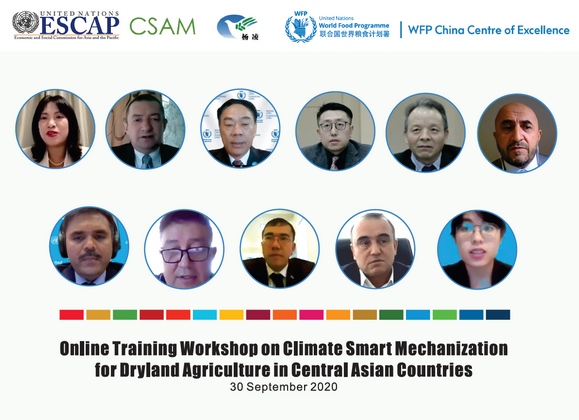Online Training Workshop on Climate Smart Mechanization for Dryland Agriculture in Central Asian Countries

To promote mechanization-based solutions for climate-smart agriculture in Central Asia, an ‘Online Training Workshop on Climate Smart Mechanization for Dryland Agriculture in Central Asian Countries’ was organized by the Centre for Sustainable Agricultural Mechanization (CSAM) of the United Nations Economic and Social Commission for Asia and the Pacific (ESCAP) in collaboration with the Administrative Committee of Yangling Agricultural High-Tech Industry Demonstration Zone of China, and the World Food Programme on 30th September 2020. Around 100 attendees including delegates and participants from Central Asian countries (Kazakhstan, Kyrgyzstan, Tajikistan, Turkmenistan and Uzbekistan) as well as representatives of government agencies and research institutes from other countries and international organizations took part in the event.
Sustainable agricultural mechanization can improve productivity and incomes in agriculture, thus benefiting both food security and livelihoods of the farming community and enabling progress towards the Sustainable Development Goals. It is especially important for the Central Asian sub-region which has large areas under arid and semi-arid agriculture and is highly vulnerable to the impacts of climate change. In addition, the outbreak of the COVID-19 pandemic has resulted in severe socio-economic consequences including for agriculture. Mechanization solutions can play a key role in enabling recovery for the agricultural and rural sector in Central Asian countries and building resilience to future shocks. In this backdrop, the online workshop aimed to promote a better understanding of climate smart mechanization technologies and field practices, provide a platform for knowledge and information sharing, and explore opportunities for collaboration among partners.
Dr. Yutong LI, head of CSAM moderated the workshop and delivered opening remarks. Dr. Sixi QU, Representative of WFP China, Mr. Peng DU, Deputy Director General of Administrative Committee of Yangling Agricultural High-Tech Industry Demonstration Zone of China, and Mr. Nikolay Pomoshchnikov, Head of the ESCAP Sub-regional Office for North and Central Asia, also delivered welcome remarks.
During the workshop, Professor Fucang ZHANG from the Northwest Agricultural and Forestry University of China, and Professor Hafiz Muminjanov, Agricultural Officer for Sustainable Intensification of Cropping systems, Food and Agriculture Organization of the United Nations, shared their expertise, experiences and knowledge in water efficient technologies, and mechanization solutions for conservation agriculture, respectively. Representatives from Central Asian countries and the ESCAP Sub-regional Office also presented their views and perspectives on the status of dryland agriculture in their countries/sub-region and the role of climate smart mechanization solutions and practices in this context.
Overall, the online workshop concluded that water efficient irrigation technologies as well as mechanization solutions for conservation agriculture have enormous potential to support Central Asian countries increase productivity and incomes in the agricultural sector in a sustainable way. They also have much potential to help countries cope with the adverse impacts of climate change. What is particularly needed is targeted measures to scale-up their adoption. Regional and international cooperation amongst countries must also play an important role in achieving this common goal.



